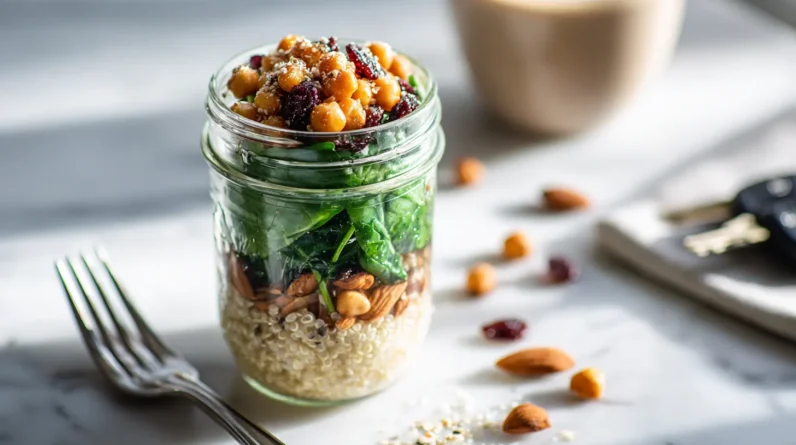
When we’re stressed, we often reach for comfort foods, skip meals, or emotionally eat, which can negatively impact our health. Stress can make us crave sugary, fatty foods and reduce our intake of healthy nutrients. However, by understanding how stress affects our food choices and learning about nutrients that help manage stress, like B vitamins and magnesium, we can make better dietary decisions. Let’s explore strategies for maintaining a balanced diet even when we’re feeling overwhelmed, so we can support our overall well-being.
Understanding the Stress-Diet Connection in Women
The intricate relationship between stress and dietary choices in women is a critical area of study that sheds light on how nutritional intake can modulate stress responses. We’ve found that B-vitamin complex supplementation can substantially reduce stress levels in women, with effects noticeable after just 9 to 12 weeks. Notably, women with a history of anxiety or depression are more likely to turn to dietary supplements for stress reduction compared to men. This could be linked to the higher reported stress levels among women, which may also explain the higher prevalence of dietary supplement use in this group. However, we must be cautious, as the belief in the effectiveness of isolated nutrient supplementation for stress amelioration often surpasses the available clinical evidence.
The Impact of Stress on Women’s Food Choices
As stress levels rise among women, so does the tendency to make poor nutritional choices, a concerning trend that’s backed by a growing body of research. Under stress, we tend to reach for high-fat, high-calorie foods, neglecting the nutrient-rich options our bodies need. This shift not only affects our physical health but also exacerbates the emotional toll of stress.
| Stress Impact on Women’s Nutrition |
|---|
| – Increased consumption of high-fat foods and snacks |
| – Decreased intake of healthy carbohydrates |
| – Higher likelihood of skipping meals |
Emotional Eating: A Common Response to Stress
When stress becomes overwhelming, many of us turn to food for comfort, a phenomenon known as emotional eating. Approximately 43% of women engage in this behavior, compared to 32% of men, indicating a gender disparity. Stress triggers cravings for sugary, fatty foods, which activate reward pathways in our brains. While these foods provide temporary relief, they contribute to weight gain, negative self-image, and difficulty maintaining dietary goals. It’s vital to recognize emotional eating patterns and develop healthier coping strategies. By addressing the root causes of stress and finding alternative stress management techniques, we can break the cycle of emotional eating and support our overall well-being.
Nutrients That Can Help Manage Stress
Certain nutrients play a crucial role in managing stress. B vitamins, particularly B6 and B12, support neurotransmitter synthesis, helping regulate mood and reduce stress levels. Magnesium is critical for anxiety and stress management, with studies showing up to 40% stress reduction from supplementation. Chronic stress depletes magnesium, making dietary intake essential. Omega-3 fatty acids in fatty fish, flaxseeds, and walnuts boost serotonin levels, regulate stress hormones, and enhance brain function. Vitamin C helps regulate cortisol and blood pressure post-stress. Protein provides amino acids like tryptophan and tyrosine that mitigate chronic stress effects by supporting neurotransmitter production. Prioritizing these nutrients can help us build resilience against stress’s impact.
Strategies for Maintaining a Healthy Diet Under Stress
Maintaining a healthy diet under stress requires strategic planning and mindful habits. We can adopt several practices to support our nutritional needs and mental well-being during challenging times.
| Hydration and Beverages | Meal Timing and Portions | Mindful Eating Practices |
|---|---|---|
| Aim for 11.5 cups of water daily | Eat regular, balanced meals | Engage fully with eating |
| Limit sugary and caffeinated drinks | Avoid skipping meals | Reduce distractions during meals |
| Choose herbal teas for calming effects | Plan meals and snacks in advance | Pause before eating to manage stress |
| Infuse water with citrus or cucumber | Include protein, fiber, and healthy fats | Practice gratitude for food |
Breaking the Cycle of Stress and Unhealthy Eating
As we navigate the challenges of daily life, stress can often lead us down a path of unhealthy eating habits. Research shows that women are particularly vulnerable, with 43% reporting overeating or eating unhealthy foods due to stress. This stress-driven eating, often involving high-fat and high-sugar “comfort” foods, can become a vicious cycle. The consumption of these foods provides temporary relief but leads to negative emotions like guilt and body dissatisfaction, which in turn exacerbate stress levels. Breaking this cycle requires a multi-faceted approach, including stress management techniques, mindful eating practices, and replacing unhealthy foods with nutritious alternatives that support both physical and mental well-being.
Building Resilience Through Nutrition and Self-Care
Building resilience against stress involves more than just managing its symptoms; it requires a holistic approach that integrates nutrition and self-care into our daily routines. To fortify our resilience, we must focus on both our physical and mental well-being. This means understanding how our dietary choices can impact our stress levels and emotional health. By incorporating a balanced diet rich in nutrients that support brain health and stress responses, we can enhance our ability to cope with stress. Additionally, engaging in regular physical activity not only improves our physical health but also boosts our mental resilience against stress.
- Prioritize balanced meals rich in vitamins and minerals to support brain health.
- Practice mindful eating to avoid emotional eating triggered by stress.
- Incorporate regular physical activity into your routine to boost mental resilience.
- Develop a self-care routine that includes relaxation techniques and adequate sleep.
- Seek social support to reinforce your nutritional and self-care strategies for better stress adaptation.
Conclusion
Together, we’ve explored the intricate connection between stress and nutrition for women. As we navigate our daily choices, let’s remember the power of nutrients to help manage stress. But, breaking the cycle of emotional eating isn’t always easy. Can we rise to the challenge of building resilience through self-care and mindful eating? The journey ahead may be uncertain, but with newfound strategies and determination, we can forge a path to wellness—as long as we keep putting one foot in front of the other.







